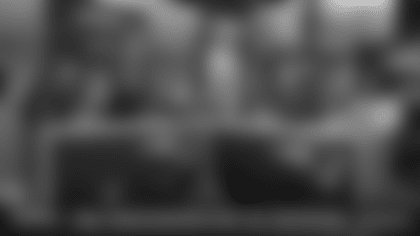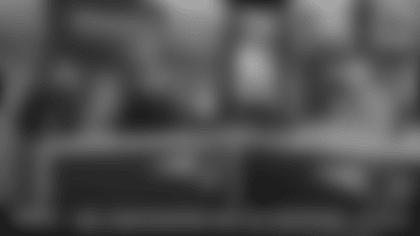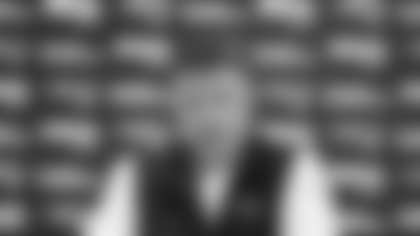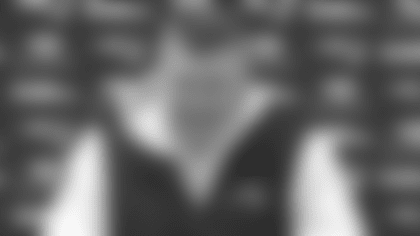HEAD COACH BILL BELICHICK
Conference Call
Tuesday, November 12, 2019
Q: How would you characterize Carson Wentz's mobility in the pocket, and has it changed at all over the last couple of years?
BB: It looks good, it looks good.
Q: Is he someone who looks to run to make a play first, or is that not something he does a lot of?
BB: I wouldn't say there's a lot of plays that are designed runs for him, but there are some. He's certainly athletic enough to keep the ball and extend plays and scramble if he's in trouble. But, I mean, I wouldn't say he's looking to take off all the time. I wouldn't characterize it as that. But, yeah, he can certainly run.
Q: How much of what you've seen from Kamu Grugier-Hill has been what you projected he may have been when you had him here in 2016?
BB: Kamu's a very good special teams player. He's really a core guy for them – plays in all the units, runs well, smart kid, productive. And he's played defensively, as well, sometimes in their substitute packages and occasionally in their regular calls. I think it just depends on – that's probably something you should just ask them, I don't know. But, he plays and he, again, brings those same qualities. He's a good athlete, he runs well, is a good space player. I think he gives them a good element of speed and athleticism on the field that, in those situations, is good.
Q: Do you recall how close he was to making the roster here?
BB: Yeah, he's certainly a guy that we wanted to continue to work with. At that point, we felt like there were other people ahead of him, but if he had a future in the league, we wanted to work with him and we didn't have the opportunity. But, that's what happens that time of year.
Q: How much does Philadelphia still run RPOs, and have they become easier to defend given how much you see them?
BB: They do a good job of it. They have a couple of different versions, I would say. And they do it maybe a handful of times a game. I'm sure if it's working well, it'll probably be more frequent, and if they don't like the way it sets up, they have plenty of other good things they can do, as well. But, it definitely shows up, I would say, in most every game and they make some plays on it.
Q: Does that allow you to defend it better because you see it more around the league?
BB: I don't know. In the end, it really comes down to how the offense executes it. So, if it's well executed and they do it well, then it's more of a problem than if they don't. And Philadelphia executes everything pretty well, and they have a good quarterback, and a good offensive line, good players, good scheme. So, it's just another thing that you have to work on defensively; its part of their package.
Q: How would you characterize how the time has been spent since the Baltimore game, and what does doing a better job coaching look like to you with the extra time?
BB: Just to do a better job. So, there are a lot of components to that, but I would say there are a lot of things we can improve in and kind of look at all of them. I think as a team – coaches, players, staff, all of us – we put in a lot of time. We work hard. We always do what we feel is best, but there are always things you can improve in, and there are always things that you can – you play a new opponent every week, so we start to see things that people are doing against us that we need to modify, change, adjust to, things like that. So, yeah, it's all a part of it. I don't think there's any one specific thing.
Q: Does a bye week mean an opportunity for you to dig in a little bit more, or do you look at it also as a necessary mental break?
BB: Well, I mean, it is what it is. It's not anything I have a lot of control over. The schedule's pretty well-set for the players, which is fine – I don't have any problem with that. They've been going at it very hard for 13 weeks, so has the coaching staff, so take a breath of fresh air. I don't think that's a bad idea at all. But, we have a little bit of extra time in terms of what a normal preparation schedule would be for the next week, and time can be valuable if you use it efficiently and constructively. So, that's what we'll try to do, and there are a lot of different options on how we can do that, and we've talked about what our options are. And in the end, we've made choices that we feel are the best at this point in time for this particular team, for the situation that we're in based on our needs. They're different for different players, they're different on different sides of the ball, they're all different problems that are being addressed or improved upon. Hopefully we'll be able to do that.
Q: What might the benefits be when you're running out of a formation that has three or four players extended as receivers, as opposed to having a fullback in there?
BB: Well, I think any play that you run in football – offense, defense, special teams, whatever it is – you're trying to gain some type of an advantage on the play. That's the idea of it. I would say, generally speaking, you'd get more right than wrong, but sometimes things happen that are disguised or work out a little bit differently maybe, and so it doesn't always work out that way. But, most of the time, you're able to gain some type of advantage. Whether that's enough for that particular situation to make it productive, or whether there are enough of those, that's another question. But, that's what you do and in this league, I would say nothing lasts very long, so if you're able to gain an advantage, your opponent's probably not going to allow you to do that for very long. So, they'll make an adjustment, then you'll have to make an adjustment and so forth. That's really the essence of game planning is trying to gain some type of advantage somewhere and use that in a certain way. Maybe the other team is willing to give you that advantage and feel like they can hold up, or maybe they feel like they need to make some type of adjustment to it if you're causing a problem for them, and that's really the game. So, there are advantages to being spread, depending on what the defense is in in some areas, and there would be advantages in some other areas depending on what they do. If you know exactly what it is they're doing. If you're not sure, if they can do multiple things out of the same look, then you have to have a plan for that too. So, each play is different, each situation is a little different. There's a method behind each one, and how well it works or doesn't work depends on what happens on the other side of the ball, and ultimately fundamental execution, because if that's not good, then it doesn't really matter what the play or anything else is. If the fundamentals are not good, then you're probably not going to have a good play.
Q: When you think of some of the resilient teams that you've been a part of through the years, what are some of the core principles that contribute to that resilience?
BB: I'm not sure I really follow you there, Mike [Reiss].
Q: Teams have things happen that knock them off course, and some teams are better capable of coming back from that. What are some of the things that have helped your teams come back from that?
BB: Well, it's kind of a broad question, Mike. Look, there have been years where – like in New York after we won the Super Bowl in '86 and then didn't have a good year in '87. That was part of a strike season and so forth, but, whatever the circumstances were, that's kind of one type of thing. You know, we haven't had a lot of 1-15 seasons around here, so I'm not really sure about bouncing back from that type of a season. Look, every season has its games that are – going undefeated in the National Football League is not every common, so losing a game, or two or more than that along the way has happened to just about every team that's ever played in the National Football League. So, we try to do everything, do what we believe in on a weekly basis, prepare and compete, correct the mistakes and analyze what happened – win, lose, or draw – and move onto the next week. So, that's – I'm not really sure.
Q: I think about the loss to the Eagles in the Super Bowl, and I could see where that would devastate some franchises. A lot of teams that have lost in the Super Bowl haven't ever been the same, and you guys ended up making it back and winning. That was sort of the basis of the question. Maybe a better question would have been: what did you experience from that loss not sending you guys down into a tailspin that maybe would have been the case for other teams that have lost in the Super Bowl recently?
BB: Right. Well, I definitely follow what you're saying there, Mike. Yeah, there are a lot of examples of that and again, that's more of a big picture, team question than a week-to-week, bouncing back from a loss type of thing. But, again, each team is its own team. It's a new team. There may be carry-over players, and coaches and some things may carry-over, but I wouldn't necessarily say they're the same. Each year is a new year, and each of our performances from year-to-year is contingent on our preparation and our ability to perform in that season that we're being judged in, not what we did in some other years. Personally, I don't really put a lot of weight or a whole lot of evaluation into what's happened in the past. I try to focus more on the present, and how that can be improved and accelerated to work to a higher level. That's really what it's about for me. If you look back at a team one year and compare it to the next year, there's – whatever the end analysis is, it is. And, there's value to that and merit to it, but the reality of it is we're in a week-to-week business, and this week's about this game, and the preparation and the performance two teams have on Sunday afternoon. I'm not sure that 2015, 16, 17, 18 really have a lot to do with it. I think this year has a lot more relevance to what we're able to do this week to prepare for the game, what we're able to execute out on the field Sunday afternoon. So, I guess I'll leave some of the bigger picture analysis to the experts.
OFFENSIVE COORDINATOR JOSH MCDANIELS
Conference Call
Tuesday, November 12, 2019
Q: Where is N'Keal Harry in terms of his progress and where he's headed?
JM: Continues to make progress, works hard and each week is an opportunity that we're trying to add more in terms of the things he can do, the things he's comfortable doing, the things we're comfortable with him doing within our offense. I think it's all positive. Everybody's working hard for the same goal, which is to have him contribute and help us win games moving forward. Nothing other than that to add to it.
Q: What are you seeing from Carson Wentz in your film studies? What do you see from the Eagles defense that challenges you?
JM: I'm not watching him, obviously, this week, but there's been a few crossover games. He's obviously a talented player, done a lot of great things early in his career and I'm sure his best football is going to continue to be out in front of him. Like most young players, you just continue to get better. That will be a big challenge for our defense I'm sure. The Eagles are an aggressive group. Coach [Jim] Schwartz does a great job of getting them to play fast and aggressive. They're physical. Their front is really impressive, very disruptive. Their philosophy has always been they want to try to limit you in the running game, force you into obvious passing situations and then get after the quarterback. They seem to be doing that very well now. They're in the top 10 in defense, they're in the top 10 in rushing yards, they're top 10 in turnovers, tackles for loss, sacks. All the disruptive statistics that a defense like this wants to be good at, they're good at them. They have a pretty unique style of play where they really get after the middle of the pocket and they play extremely hard. They've got a lot of that play up in the front; their linebackers are very active, quick, fast guys that can create disruptive plays behind the line of scrimmage, as well. Their secondary plays really well within the scheme. They've got some really good players that we've played before, going back a couple of years. They understand that the rush is really good, they know that the ball is going to have to come out and they do a good job of capitalizing on mistakes the offense makes. A really big challenge for us and playing them on the road adds another element to that – the noise and playing in their stadium will certainly add another element to that. We're going to need a great week of practice to be ready to go on Sunday.
Q: How would you characterize what the coaching challenge has been like for you with the offense this year?
JM: The players change every year and the schedule is different, and sometimes we either lose coaches, or change some people on our staff. But, the challenge every year for coaches and the way we look at it is really very much the same. You have a group of players that is going to be active each week and you have a defense that has a certain scheme or style play, and strengths and weaknesses with their personnel, and your job as a coach is to try to move the football and score points with what's available to you in terms of personnel, and to try to figure out what schemes you can utilize and perform well in order to make first downs, and score touchdowns and not turn the ball over. That part is really no different. We continue to do that each week and then we go back through that every single week of the year. This week, the challenge is the Eagles, which is a significant one. The personnel we have available to us may or may not be exactly the same as it has been every other week of the season based on injury and availability. You're always trying to figure out scheme and what you want to do against what they do to try to minimize the defense's opportunity to make negative plays and try to maximize your efficiency on offense every time you take the field. I look at it very much the challenge being the same each year, each week. If you look at it like that it's a pretty consistent cycle. There's some variables in it that change, but there's also a lot that stays the same and for us the goal is the same: try to figure out how to use our players and put them in the best position to be successful against the defense that we play.
Q: It looks like in Baltimore you guys found some rhythm in using the hurry-up style that we've seen from you before. How consistent can an offense use that, whether it's for conditioning reasons or wanting to change up the tempo for the defense that you're going against?
JM: I think tempo is one of those variables that you certainly can implement each week if you feel like it's the right thing to do. I think some of that is dependent on our numbers, or our health in terms of how we need to play the game. If we have players that that may affect in a negative way, then obviously you have to be careful and be smart about that and make good decisions. Sometimes, that's certainly contingent upon what the other team does, how they play, how it may impact them. And at the end of the day, it's one of the questions you ask yourself about: "Is this the best way for us to be productive on offense?" which is ultimately the goal every week. It's like saying, "Is throwing deep every week a good thing? Is being in an empty backfield a good thing? Is using draw plays a good thing?" I think it's one of those questions you go through each week and try to figure out is this going to be a productive way for us to play? And if it is, then great, and if it's not, then you try to make the best decisions that you can based on the information that you have. Certainly, it was something that we chose to do, and whether we choose to do it again and again is a whole other story. Obviously, we didn't win that game and we made plenty of mistakes and didn't capitalize on all of our opportunities, so there's a lot for us to work on in terms of technique and fundamentals, regardless of whether we're playing fast or not. Ultimately, that's what we're after is trying to play our cleanest games of the year as we move forward.
Q: Against the Ravens, you had 10 guys playing every snap and only rotated the running back, which was pretty unique for you guys. Have you ever had a game like that in the past and why did you decide to use that in that game?
JM: We've played games similar, maybe not exactly the same in terms of the volume of snaps with one grouping on the field. It was something that we looked at during the week based on the situation. You always look at health and availability and what you think may give you the best advantage, whether that be the run game, pass protection, opportunities to make big plays, convert third downs, whatever it may be. It was something we had discussed and talked about, and we decided to utilize it and felt like it might give us the best chance to be productive on offense. At the end of the day, we didn't do enough and didn't score enough and have to figure out a way to put more points on the board, finish better in the red zone, take care of the ball a little bit better. Ultimately, that's what my job is and that's what I'm after, so I have to do a better job of trying to figure out what the formula is for this week, and that's what we're focused on now. Hopefully, we can do that and improve in some of those areas which would really help our team out.
Q: What's it like for you and Tom Brady to call the game from the line of scrimmage and how much freedom did Tom have to call things as he saw it?
JM: When you play fast or use a no-huddle, you'll likely make your decisions a little quicker. Not every play is lightning speed or anything like that. Like in a two-minute drill, decisions have to be made faster, calls have to get in quicker, so that you give the group on the field an opportunity to get lined up and play. Any team that's in no-huddle, any staff or any coaching staff or any play-caller, you have to understand the nature of doing that. If time is an issue or if you're choosing to try to expedite your operation, then your decisions have to come faster. Tommy's been in our system a long time, so there's certainly times when he may see something and have the ability to try to get us in a better situation.
Q: How much of your bye week was spent self-scouting and what's that process like for you guys?
JM: There's a lot of things you can choose to spend your time on in the bye week. We certainly look back on what we've done and the games that are most recent to us, the things we're doing well, the things we need to make some improvements on and progress on. We certainly try to evaluate what we may be able to do differently. Maybe what we need to practice more of when we need to spend more time on an individual drill or things like that. There's always an element of that in the bye week and there's always an element of trying to look at the opponent that you have coming up after the bye week, as well. In this case, there wasn't going to be any more Philadelphia tape to look at because they had a bye as well, so all of the film was in and it gave us an opportunity to digest a really good defense and give us a couple of extra days to try to figure out the things we feel good about doing against Philly, and give us a little bit of a head start on that, too. You can't do everything in a bye week; it's impossible to go over every single thing. If you try to do too much – sometimes, I've found out in the past – nothing ends up getting accomplished. I try to pick out a few things that we can figure out to try to make progress in and work with your guys in. A lot of that is individual techniques and fundamentals on things that we do a lot of, which doesn't sound all that sexy, but it's the truth. If we're better fundamentally, if we're better with our technique individually at each position on certain things that we repeat over and over again, our football team will ultimately benefit from that.
Q: Would you say that the Eagles defensive scheme, coverage wise, is about the same as it was when you guys played them in Super Bowl LII, or have they changed things?
JM: There's plenty of elements that are similar, but Jim has been one of the most productive coordinators in the league for a long time. The way he calls the defense, he has the ability to make subtle changes to try to limit certain players or certain schemes in your offense. That certainly showed up in the game we played a couple of years ago. He has all the different variations, all the varieties of zones and mans, he has them all in his system. What he does a tremendous job of is trying to use the things that put his players in the best position to have success, and that's why it's such a difficult challenge every time we play against them. There's going to be something that we may not practice as much that he may use more; that happens frequently when you play against them. This is a group that's playing very well, they are very disruptive. The one thing that stands out when you watch them is that they're all on the same page, and they all play fast and aggressive because they know what they're doing. Any time you play a defense like that, you know they're not going to beat themselves. You know they're not going to make a bunch of simple mistakes and give you easy yards and opportunities. They make you earn everything you get, which is why it's such a great challenge, and they've got really got players and they are extremely well-coached. This is going to be a huge challenge for us. I'm excited for the opportunity to get started on them tomorrow with our guys, really get started on them. I know we were in here yesterday, but looking forward to that, and obviously looking forward to a very competitive situation on Sunday.
Q: So you would call Coach Schwartz a game plan coach?
JM: There are certain things that are going to show up each week, but like I said, Jim's one of the best in our league and there's a reason why. He doesn't just sit there and tell you what he's going to do on every play. He's got all the different variations of coverages, he can challenge you in terms of pressures, he can use just a four-man rush if he wants to, he can max pressure you, he can play man, he can play zone – there's a lot of different things he does. Plenty of things will show up from game-to-game that you think you might get a good chunk of, but ultimately, he makes every down a challenge and the players play extremely well within his system, and that's a tribute to him and the guys that work for him on his staff.
INSIDE LINEBACKERS COACH JEROD MAYO
Conference Call
Tuesday, November 12, 2019
Q: What differences can you share about Bill Belichick as a coach during a bye week as opposed to now your boss during a bye week? Did you learn anything new about him behind the scenes this past week and a half?
JM: Thanks, Tara [Sullivan]. I'll be honest with you. Coach is the same person, day-in and day-out. So, it doesn't matter if it's a bye week or Super Bowl week; he's the exact same person. We did a lot of self-scout, a lot of film work and we prepared like it was a game week. So, I would say it's pretty similar.
Q: Have you had much interaction with Byron Cowart and what have you seen from him in his rookie year?
JM: Yeah, Byron, he's come in – well, first of all, let's talk about his physical stature. I mean, he's a big man, strong, able to do a lot of different things. Definitely comes to work each and every day. He's out early and out late at practice trying to get better. He has a great room, older guys in there to learn from and a coach that's willing to work with him. So, definitely hopeful that he continues to grow. Obviously, as a rookie, you have to continue to work on fundamentals, and I'd put Byron in that same category.
Q: As a former linebacker, how difficult of a challenge is it to slow down a guy like Zach Ertz? What does your position group and the defense as a whole have to do to cover this guy for four quarters?
JM: Yeah, it's tough. Anytime you have a player like Ertz or any of these guys, a special player like that, it's not just one person, right? It's multiple people, covering him with different people, hitting him from different angles. You just can't show him the same look. He's been doing it – what now, this is year seven for Zach – and he's been playing at a high level. So, definitely going to take all 11 guys on the field to try to slow him down.
Q: What have you seen from Ja'Whaun Bentley and how much fun has it been working with him in his development this year?
JM: Yeah, well, first of all, he wears 51. So, naturally I have an affinity to work with him. Bentley's one of those guys – very talented, and to your point, this is like a rookie year for him. At the same time, he's been around the organization. He knows what to expect. He comes to work and brings his hard hat each and every day. And, going back to the room – you look at that room, it's Jamie Collins, it's Dont'a Hightower, Kyle Van Noy. He has a bunch of guys who are very helpful, smart guys, but also good football players and willing to work with him. It's definitely been a pleasure to help him in his development. We will see how it goes.
Q: When you throw something new at him or something he may not have seen before, how does he respond to that?
JM: Oh, he's a smart guy. He went to Purdue. He's like an engineer. He's a smart guy, you can through a bunch of different things at him, and that's what we pride ourselves on here as linebackers for the Patriots is just overall versatility, and with that, you have to be a smart guy to play different roles. He's no different.
Q: How difficult is it for linebackers to balance being aggressive and coming downhill at blockers, versus reading and scanning multiple gaps like you might have those guys do on a regular basis?
JM: Yeah, you know, I always preach, 'Don't get downhill until you know the scheme or until you know who's blocking you.' I mean, that's part of the game. It's not like back in the day where people would line up in big personnel, two backs, a fullback – you kind of knew what to expect. Now a days, people are running the ball out of small people and throwing it out of heavy people. So, definitely reading your keys helps you as far as getting downhill.
Q: How much extra time do you get to spend with your brother, Deron, that you wouldn't normally get to spend with him now that you are working with him for the first time?
JM: Yeah, thanks for the question, Mike [Reiss]. You know, for seven years or eight years, he was in Canada, so I didn't really get to see him much. It's been great working with him. With that being said, I rarely see him. He lives in the weight room, and I live in the film room. So, we cross paths in the hall and try to grab lunch when we can, but for the most part, we're in two totally different worlds, even though we're in the same building.
Q: It seems like you've been updating your social media this year with some motivational or thought-provoking messages. Where do those come from and why do you choose to post them?
JM: I read a lot. Sometimes people need those nuggets. I don't like to post about just things, material things. I just like to drop little nuggets of wisdom, and I'm hopeful, honestly, that my linebackers see those posts. It definitely helps motivate me. You know, the season is long. Sometimes you need those words of encouragement. It's definitely an up-and-down season, even though we're sitting here at 8-1. Sometimes you've got to take a step back and realize that, and some of those quotes helps with that. Hopefully it's helping you, Phil [Perry].
Q: It is. I'm thinking a lot more when I'm on the Internet, thanks to you. How much has social media changed the locker room or how players are thinking about things or maybe even their own performances? Has it been a significant shift that you've seen?
JM: Yeah, I think it's by a player-by-player basis. I remember when I first came into the league, you think about the room. It was like Junior Seau, Mike Vrabel, Tedy Bruschi – guys who had flip phones. They had flip phones for the longest time. They still had Blackberries in their pockets. So, they weren't even really thinking about social media. So, when you would go in the locker room, I would say that just the overall vibe, you were in there playing cards and things like that. Now, the younger generation, they're checking their social media and things like that. But, I think the players around here do a good job, when they're in the building, really focusing on football. But, if I had to say something that's changed, I'm sure when they're on their phones, they're checking that stuff. As far as how it kind of affects them – what people say on social media and things like that – I really don't think they take much into that. You know, everyone isn't a Patriots fan, so I think they realize that.











































